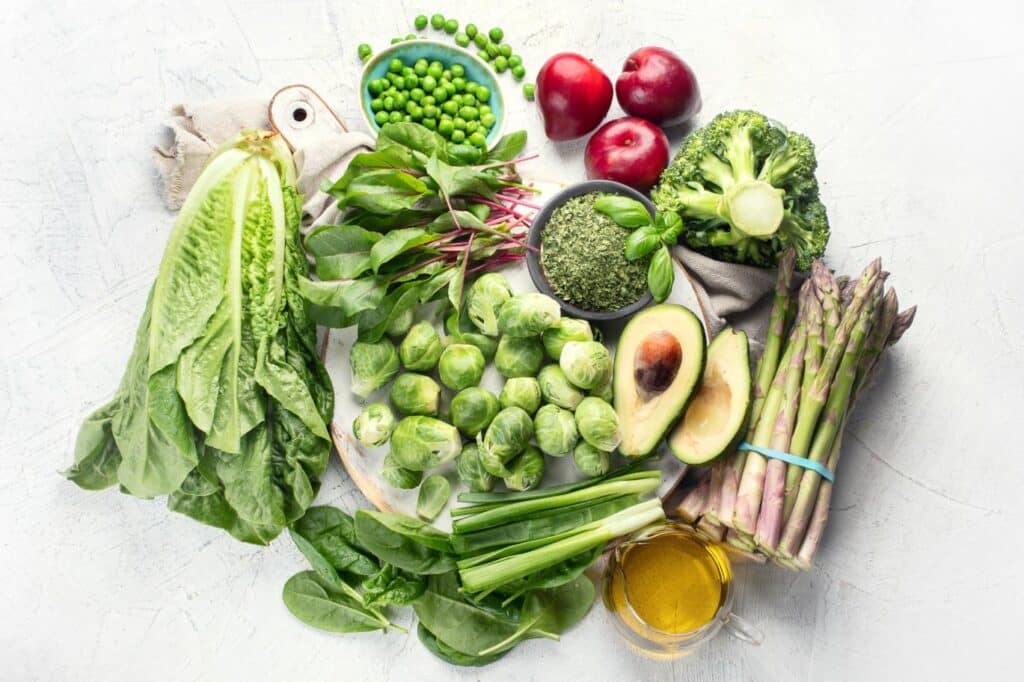While our bodies still need the same amount of vitamins and minerals, activity, sleep and hydration as we get in the summer months, we often find all of these things more difficult to get in the winter. Days are getting shorter and darker, and the air is getting colder and dryer. We are less likely to spend time outside and get the moderate exercise our bodies need each week. Plus, the holiday season from November to January has us feeling a bit unbridled when it comes to our healthy habits. However, nutrition experts agree that there are easy ways to give our bodies the extra TLC they need to stay healthy and still enjoy the comfort foods and festive days to come in the next few months.
ACE your Vitamins
Experts agree getting enough essential vitamins and minerals is important for our overall health and immunity in colder months. “Cold weather, and more time indoors in close quarters with others, often increases the risk of catching a cold or the flu,” says Elizabeth DeRobertis, MS, RD, CDN, CDE, registered dietitian and certified diabetes educator at White Plains Hospital. “To support our immune system, it’s important to consume foods rich in vitamins (especially vitamin C), minerals and antioxidants. Incorporating citrus fruits, leafy greens, berries, garlic, ginger and nuts into your diet can be beneficial.”
Sun Substitution
With less sun exposure because of shorter days and colder weather, we run the risk of becoming vitamin D deficient or more vitamin D deficient. Fortified milk, fortified cereals, mushrooms, eggs and fatty fish like salmon, mackerel and sardines can help make up what we are losing from less sunlight exposure. Lisa Coontz, MS, RDN, CDN, clinical dietitian at Greenwich Hospital for Yale New Haven Health loves kefir, a fermented fortified milk beverage—a sort of cousin of yogurt—as a great source for vitamin D and important immune-boosting antioxidant effects in winter. She pours hers over frozen berries so it gets frosty and tops it with nuts or other fresh fruits for a healthy immunity boost. The kefir freezes up over the berries to make something more like frozen yogurt, says Coontz, who adds that kefir, like yogurt, is an important source for probiotics, which have been linked to a healthy digestive system. DeRobertis agrees that probiotics, beneficial bacteria that support gut health and immune function, should be part of our daily diet and/or supplement regimen.
Root and Leafy Veggies

Colorful orange veggies and fruits and dark leafy greens are a must advise nutritionists when it comes to getting vitamins A, C and K. Vitamin A carotenoids are found in orange foods like sweet potatoes, butternut squash, carrots and peppers and dark leafy greens like kale and spinach. Cruciferous vegetables like Brussels sprouts, bok choy and broccoli and cabbage are wonderful for vitamin K and vitamin C. Citrus fruits like oranges, lemons, limes and grapefruits, and in particular, bell peppers, are a good source of vitamin C.
Vitamin E can be found in a number of places, including wheat germ, sunflower seeds and oil, and nuts. Lesser-known sources are pumpkin, bell peppers, and greens like beet, collard and spinach.
“The No. 1 piece of advice I can give is to eat the rainbow, and eat mostly fruits and vegetables,” says Coontz.
Zinc for Immunity
Oftentimes, the winter holidays like Christmas, New Year’s Eve and Valentine’s day are popular days to indulge in seafoods. The good news, oysters and crabs are a great source for zinc, which is important for immune function, says Ilyse Schapiro, founder of Ilyse Schapiro Nutrition, which serves Fairfield and Westchester counties. She is also a two-time author. Her latest book, Your Everyday Diet and Nutrition Questions and Your Everyday Nutrition: 100 Answers to the Most Common Questions About Losing Weight, Feeling Great and Getting Healthy, is out November 7. She says, getting vitamins and nutrients from our food is wonderful, but might not often be enough. “In general I do believe we all do need some form of supplementation to our regular diet, too,” she adds.
Holiday Hump
Getting through the holiday season, for many of us, means ditching our healthy habits entirely, but says Schapiro, a few simple steps can keep us from going off the rails for 60 days and make those new year’s resolutions easier to stick to in the final stretch. Her first piece of advice: eat consistently throughout the day. (We like the sound of that!) Lots of people wake up Thanksgiving or Christmas morning and say, “I’m going to eat a lot later, so I won’t eat at all this morning.” Schapiro says that is a mistake. Never skip breakfast, she advises. Then, if you’re going out to a restaurant, have a snack ahead of time. If you are having multiple courses for Thanksgiving, spread them out so you aren’t eating everything at once. “And start your meals with a big salad or vegetable soup that fills you up. Then, during your main course, make sure it’s focused on protein and lots of veggies,” adds Schapiro.
Hydrate

With dry air and cold temperatures our bodies are working hard all winter long. It’s important to hydrate, particularly if you are planning to have alcohol, advises Coontz, who says you don’t have to give up an occasional cocktail to stay healthy. “Obviously, everything in moderation, but also hydrate before, hydrate between and hydrate after, or switch to a mocktail.”
During the weekdays, drink water and tea. Broth-based soup is also a good source for nutrients and hydration.
Keep Moving
Since we are spending more time indoors, it takes a bit more effort to get the weekly recommended 150 minutes of moderate-intensity exercise our bodies need in winter. “Keep moving,” advises DeRobertis. “Find some indoor activities you enjoy if you find you aren’t being as active in the cold weather,” she adds. “There are so many free videos online that offer everything from yoga to Zumba.”
Be Mindful
“There’s a lot of studies that say human connection and social get-togethers are important, right?” says Coontz. “Just be mindful and not say yes to everything. Check in with yourself. You don’t have to go to every single party. Make sure you are not overextending yourself.”
Focus on the days in-between gatherings, advises DeRobertis. Getting enough sleep, enough water and enough vitamins will keep you healthy, so you don’t have to say no to the get-togethers you don’t want to miss and gives us more flexibility on holiday celebration days to spend extra calories and be OK with our weight management. Setting aside time to focus on our health and well-being is not only about what we eat but what we do and how we feel emotionally.
“Chronic stress can weaken our immune system” says DeRobertis. “Practice stress management techniques like meditation, deep breathing exercises or engaging in hobbies you enjoy to reduce stress. It’s not realistic to say ‘don’t be stressed’ but it is realistic to find other healthy outlets for stress relief.”




